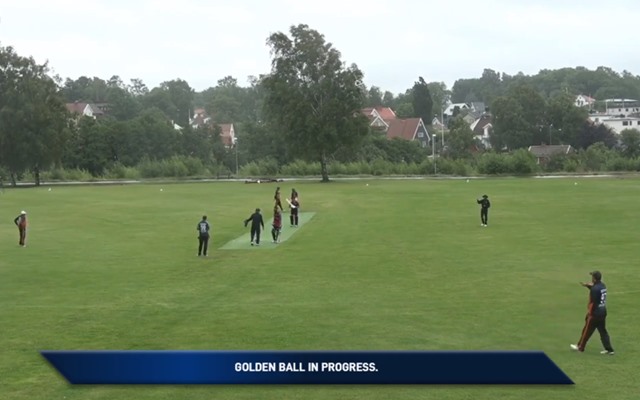Explaining the Golden Ball concept in ECS T10
Seaside CC and Jonkoping CA played out only the second Golden Ball in the ECS this year.
3 Min Read


Exactly one year ago, England and New Zealand played out a Super Over in the World Cup final and the winner was determined on the basis of more boundaries hit. After the super over also ended in a tie, England were declared the winners as they had scored more boundaries in the match. As this rule turned out to be controversial, ICC changed it and introduced multiple super overs until one team scores more runs.
Interestingly, the officials in the ongoing European Cricket Series (ECS) T10 have come up with the ‘Golden Ball’ concept in the event of a tied match instead of a super over. In the fifth game of Gothenburg leg of the Series between Seaside CC and Jonkoping CA, both the teams ended up scoring 90 runs in the 10 overs. And then the Seaside CC (chasing team) won the match on the Golden Ball which left the viewers and the fans a bit confused.
Moreover, this was the second time the match was decided with the Golden Ball, with the first instance coming almost four months ago when Madrid United registered a victory against the Levante CC in the ECS Alicante leg.
— AbkiBaarSoumyaSarkar (@SoumyaSarkarFan) July 14, 2020
What is Golden Ball?
While everyone is aware of the Super Over in the event of a tied game, Golden Ball is something new. So here, we will explain what actually Golden Ball is in detail:
If the match ends in a tie, the chasing team gets an additional ball to face and they will have to score two or more runs to emerge victorious.
The Golden Ball can take place three minutes after the conclusion of the match and the ball has to be bowled by the player who bowled the last over of the innings unless he is injured.
From the batting side, any batsman who has not been dismissed in the innings can take the strike. Even the non-striker shouldn’t have been dismissed in the innings. In the event of the chasing team getting bowled out, then the last batsman dismissed should be at the other end.
The ball has to be bowled from the same end as the last delivery of the innings was bowled conditions permitting.
Normal rules apply for this ball as well. In case of no-ball, a run will be added to the batting team and the next delivery will be a free-hit. In case of a wide, a run will be added to the batting team.
If the Golden Ball is not possible due to exceptional circumstances (rain, light, ground conditions), then the match will be declared tie.
If the result is a tie on Golden Ball or even Golden Ball doesn’t happen due to exceptional circumstances in a knock-out match, then the winner is determined by a team’s performance in the league stage in the following preference: Group Standing, Most Points, Most Wins, Net Run-Rate.
If the two teams cannot be separated even after all this, then the winner will be determined by drawing the lots.
(Details have been taken from ECS official website Rules, Regulations and Playing Conditions document)
Download Our App